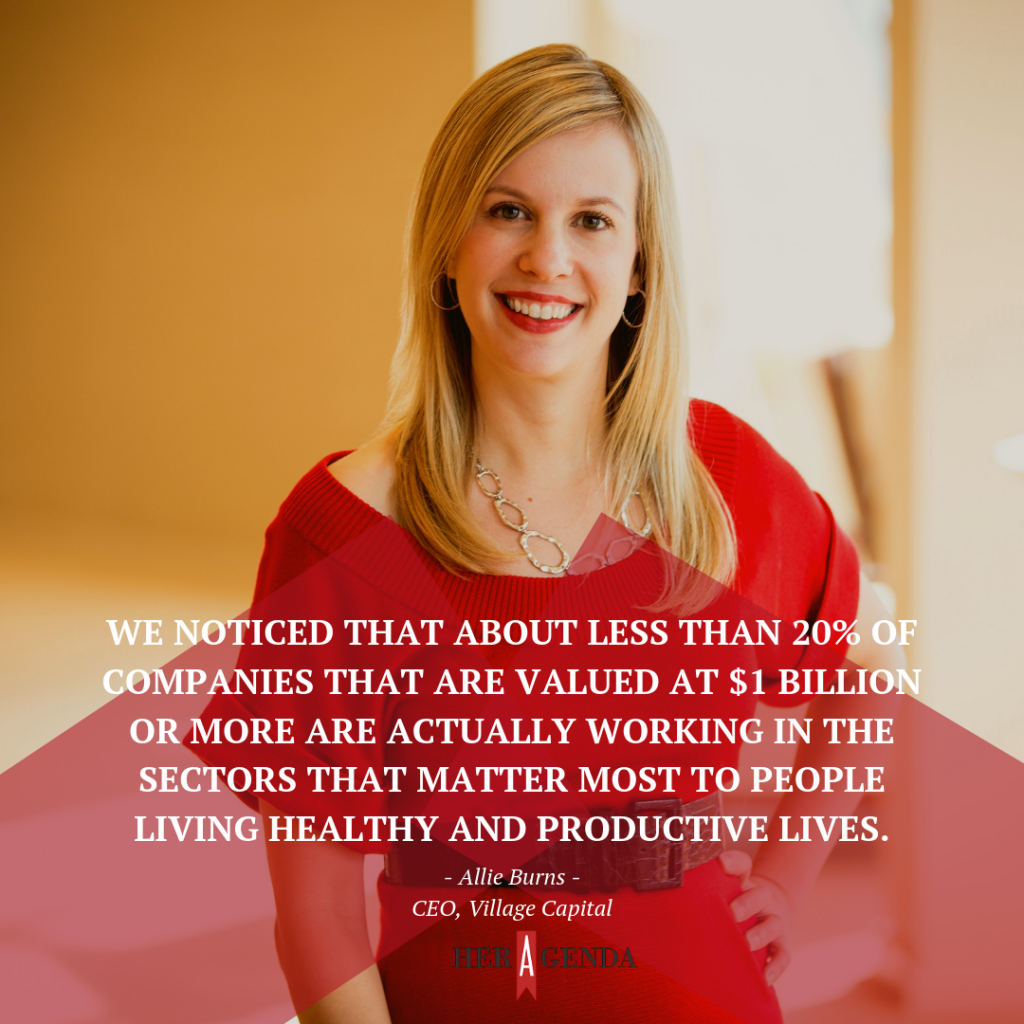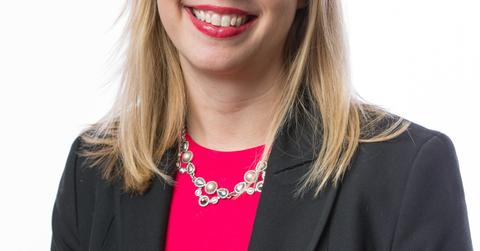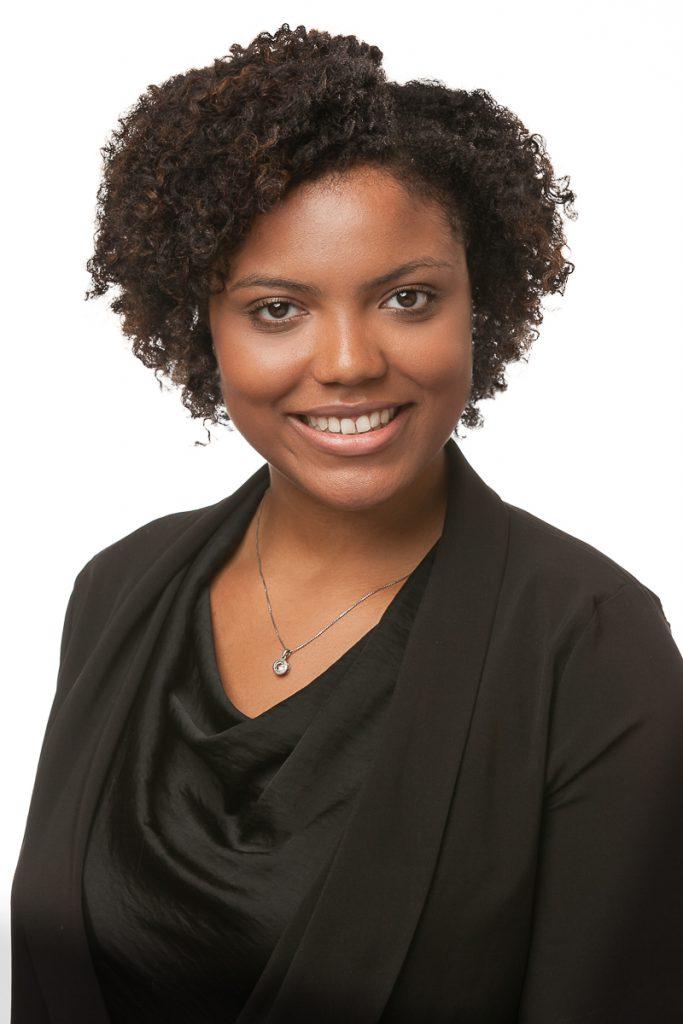As Village Capital’s newest CEO, Allie Burns is not only championing diverse entrepreneurs but also pushing investors to look at how businesses are positively impacting people’s livelihoods across the globe.
Village Capital’s mission is to reinvent the system to back entrepreneurs of the future. When asked what reinvention means, Burns explained that her team’s desire is “[T]o transform the flow of capital to a more diverse set of people, problems, and places.” Right now when you look at the current state of venture capital, about 2% of funding goes to all female-founder teams and far less than that goes to teams founded by people of color, particularly Black and Latinx founders.
Despite these challenges, Allie Burns is not shying away from what she views as a huge opportunity to change the system. Over the last 10 years, Village Capital has deviated from the norm and successfully worked to shift the power dynamic by running programs that allow entrepreneurs to sit at the center of investment decisions.
During her conversation with Her Agenda, Allie shared more about her passion for social impact, overcoming hurdles as an underrepresented entrepreneur, Village Capital’s new tool for benchmarking progress, and exciting companies solving big problems.
Her Agenda: What does a typical day for you consist of?
Allie Burns: It is hard to say what my role is like any day. That being said, I would break it down into two different types of days. If I’m in town, as I spend about 50% of my time on the road, I am spending a fair amount of time touching base with our senior leadership team. We are headquartered in DC but have a highly distributed team because a lot of our work is global. The day is a combination of facetime with team members and video calls with others to better understand what is happening and what the challenges are related to our internal operations as well as the work we do to directly support entrepreneurs.
I also spend a lot of time connecting with existing and potential partners who are aligned with our broader vision and mission to think about ways that we can improve on our work together. All of this is what I spend majority of my time doing. Additionally, I carve out time when I am in the office to focus on strategy and to synthesize my learnings, both from the internal conversations, external conversations, and what’s happening when I’m on the road. When I am on the road I attend and speak at conferences to carry our mission forward.
We have moved from seeing ourselves as a traditional accelerator and fund to thinking about how we operate as a platform to support global entrepreneurs.
Her Agenda: How would you describe your career path up until you became the CEO of Village Capital?
Allie Burns: My career is definitely the story of being open to various twists and turns. The term “impact investing” was coined in 2008 and I was in business school at that time. The field of entrepreneur support, which is the nexus of where I sit, was largely limited to traditional institutions that are housed in local and national government. There was no such thing as an accelerator and so I honestly didn’t expect to end up in this field. The first decade of my career was following a fairly linear path in marketing and communication. A lot of my work was actually prepping other people to do interviews like this. I was supporting largely tech companies and tech innovators by building up their profiles.
Along the way I discovered that I had a passion for this fascinating intersection between entrepreneurship, innovation, and social impact. That was influenced by a couple of things. I went to business school because I wanted to do something that was more meaningful. I went to Thunderbird School of Global Management in Arizona because I knew the school had a strong reputation in corporate social responsibility. After business school, I had the opportunity to go work for Jean and Steve Case, who founded AOL. They were both early innovators in impact investing and amazing people thinking about how to use, as they say, “all the tools in the toolbox” to invest in entrepreneurs having a positive impact.

In that role, I traveled around the world and we came across a big discovery when we crunched the numbers from the National Venture Capital Association. Now you hear this data point a lot but it wasn’t something people were looking at in 2011 or 2012. We discovered that 75% of venture capital was concentrated in only three states. Not surprisingly, these states were New York, Massachusetts, and California. We knew because we were meeting with these great entrepreneurs, that there were tons of opportunities to put capital into companies whether they are in Nashville or Nairobi. Entrepreneurs there were doing awesome things and struggling to raise money. Then the opportunity presented itself to work at Village Capital and my first role here three years ago was COO.
Her Agenda: What are your top goals for Village Capital over the next year?
Allie Burns: We are looking to take our mission to the next level. We have helped 1,200 entrepreneurs become investment ready to date and helped them better position themselves to raise capital and generate revenue. We have data that proves that the programs we run are effective. How do we do that for far more entrepreneurs than 1,200? We have moved from seeing ourselves as a traditional accelerator and fund to thinking about how we operate as a platform to support global entrepreneurs. Over the next year, we are focusing on continuing to provide hands-on investment readiness training to entrepreneurs who are working in a few key thematic areas including the future of 1) work and education 2) finance and financial inclusion and 3) sustainability.

All these themes help people live healthy and productive lives; something which we are really excited about! We also recently released a tool called Abaca and it really is intended to be a marketplace for connecting entrepreneurs and investors in a way that brings a common language to the often mystifying process of raising capital. For most people who are entrepreneurs, when they try to raise money they receive feedback that is oftentimes confusing or unclear. Even when they are successful, they don’t necessarily know exactly what the formula was for replicating that success the next time. The idea of Abaca is really to provide an online tool that allows entrepreneurs to effectively assess themselves based on what an investor typically looks at. On the flip side of the marketplace, there are investors who are self-identifying based on at what stage they invest, but also the specific aspects of a company that they are looking at. The idea is ultimately, if you can put those two things together, you can use the technology on a more anonymized basis. Through this formula you can significantly change the top of the funnel so the companies that investors see are not just the companies in their networks but a whole host of companies that are from different geographies and backgrounds.
Our last goal over the next year is to provide tools and resources to other entrepreneur support organizations who are looking to create best practices and build a more inclusive way to support entrepreneurs.
Her Agenda: How did you go about deciding to focus on the sectors you all support?
Allie Burns: The starting point was a data point that we saw, in addition to where venture capital goes in terms of geography, gender, and ethnicity. We also noticed that about less than 20% of companies that are valued at $1 billion or more are actually working in the sectors that matter most to people living healthy and productive lives. This includes sectors like financial inclusion, inclusive housing, health care, environmental sustainability, and sustainable food. We saw an opportunity in these huge parts of our economy that have the most potential to have a positive impact on communities and community health.
We have done a lot of work in financial inclusion in Africa because there has been a huge transformation of the digital economy through digital payments, etcetera. A huge influx of startups that are working in that space are exciting. In the U.S., we run one of the longest standing food and agriculture accelerators because we saw a huge opportunity to build up companies that are transforming how we get our food, what food we eat, and how our food is stored safely and sustainably.

Her Agenda: What is a company tackling a big problem right now that you are most excited about and why?
Allie Burns: It feels hard to pick a favorite child, but the one I’m thinking of is really interesting and emblematic of the challenges that we’re trying to address as a company. The company is PiggyVest. They are based in Nigeria and are a female co-founded company. They certainly deviate from the traditional path for a company founded by a white guy in Silicon Valley that is really well-networked. Odunayo Eweniyi is the founder and she is a Nigerian woman trying to build a business in a geography that is massively overlooked, solving a really hard problem that a lot of capital isn’t flowing to. About 80% of Nigerians need to save at least 40% of their monthly income to survive and pay for everyday expenses but there isn’t a credit system so a large majority of payments are made in cash. Nigerian millennials want to save so PiggyVest, essentially was created to help savers deposit as little as $1 a day into an online account and then they actually can’t touch that account until there is an agreed-upon withdrawal date.
Her Agenda: What is a piece of advice you would give other women interested in entrepreneurship and/or currently growing a business?
Allie Burns: There are a lot of challenges that data certainly shows, but I also think there’s never been a better time to be an entrepreneur, whether it’s as a founder or in some other realm as an investor or through entrepreneur support. Now there are so many resources that exist today to support women-owned and women-led businesses. I would encourage anyone who has an idea that is trying to figure out a way to get it started to pursue it part-time. Unfortunately, I think any entrepreneur often has to figure out how to do this while balancing a day job at first. But there are more and more resources that are thinking about how more female entrepreneurs can enter the pipeline because women are actually starting businesses at higher rates than men.
Also, find other founders and people in your community or find one or two mentors that can help introduce you to a community. Don’t try to do it alone. I think that there is an easy default for any entrepreneurs to say “I have to go figure this out and roll up my sleeves.” I recommend connecting to a broader community.

Her Agenda: What’s the best advice you’ve ever been given?
Allie Burns: To focus on building out my own personal board of directors. I was encouraged to think about who these individuals were early on and have been able to build relationships with each of them. I think one of the mistakes that is the easiest to make is thinking that people are too busy to make time for you when you’re more junior than them. This is absolutely not true. If I hadn’t taken that advice, I think I might be in a completely different place. You need people to not only coach you through the different aspects of your career but also your life; people who are going to be the cheerleaders for you when days are challenging and you don’t know whether you’re doing the right thing. Building your own personal board of directors and being deliberate about that as early as you can in your career is a great piece of advice I received.
Her Agenda: What book are you reading right now?
Allie Burns:Principles by Ray Dalio. I have met a couple of people who work with him and I was fascinated by the structured way that he works, and learning more about his journey. The other book that I just finished that I want to mention, because it really has me thinking about our mission more broadly and why we are doing the work that we do, is Just Mercy by Bryan Stevenson. I am a bit late to the party as the book came out in 2014 but it has me thinking about the systemic issues that underlie all of the work that we are trying to do at Village Capital. It is certainly a very different subject matter that relates to criminal justice, but the broader message of how do we address deeply rooted structural issues resonates with me.
[Editor’s note: This interview has been edited for length and clarity.]









